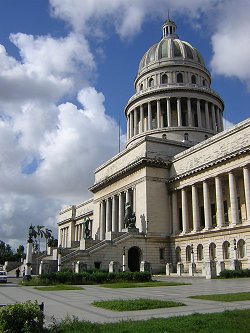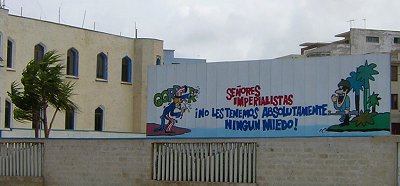Sitting out a storm in Havana, Cuba
September 2004
On September 11th, 2004, CNN took a few minutes out from its coverage of the anniversary of the 9/11 attacks to report on Hurricane Ivan, the massive storm that was presently ravaging Jamaica and was expected to hit the United States in a few days' time. Scarcely mentioned was the fact that in between, directly in the hurricane's path, lay the Caribbean's largest city: Havana. From my hotel room in the Cuban capital (satellite TV is illegal for ordinary Cubans, but is permitted to foreigners in hotels), I watched the weather forecasts apprehensively.
When I set out from Britain three months earlier, I had never intended to visit Cuba. I had come to Central America to count frogs in the mountains of Belize, as part of a biological research project. However, while rattling through the jungle on one of the long landrover journeys to and from the research station, it had occurred to me that Cuba was not far away, and that this might be my last opportunity to visit Fidel Castro's 'communist paradise' while the old man is still alive. On the Internet, I found affordable flights from Cancún to Havana (used by Americans who visit Cuba by circuitous routes in order to get around the United States' embargo against travel there), and having finished the frog research, I booked myself a trip to the infamous island.

Clouds gather behind the Capitolio building in the centre of Havana
Contrasted with the bright lights and bustling commerce of capitalist cities, Havana is a surreal place. It resembles a cartoon city in which someone has forgotten to fill in the details: there are none of the prominent advertisements, roadsides stalls or glitzy shopfronts that clutter Western cities. Instead, the streets are fronted in most places simply by bare concrete buildings (most of them in a terrible state of disrepair), adorned only by the occasional patriotic slogan. Though the historic city centre is beautiful, its suburbs most definitely aren't; many look like pictures of the old Soviet Union. The city is quiet, with far less traffic than in most capitals, and some of the cars that do exist are virtually museum pieces. Cuba has been prohibited from importing goods from the United States since the 1950s, and many classic vehicles from that era still chug along the streets of Havana.
On September 12th, as Hurricane Ivan drew nearer, CNN carried an interview with a reporter standing on the Havana sea front, looking suitably blustered and flustered. (Though taking place in a major capital city within a hundred miles of the USA, the interview was conducted via the kind of fuzzy video phone normally used by correspondents in war zones - one of the many constant reminders of the appalling state of relations that still exists between Cuba and the United States.) I wandered along to the spot and found that, contrary to the impression given on TV, it was quite a nice day. The sun was shining hazily through the clouds and the strong breeze blowing off the sea made a refreshing change from the sweaty heat that generally pervades the city. CNN had gone. The crumbling concrete residences along the sea front had been evacuated, and glass windows were cris-crossed with parcel tape to protect them from the coming storm. Plywood is scarce in Havana.

The Havana sea front, as the fringe of Hurricane Ivan approaches
It is impossible for a foreigner to walk anywhere in Havana without being accosted by enthusiastic locals. Some want money or help, some want to sell cigars or chicas, some want to lead you to a bar or restaurant, and some simply want to have a conversation and practice their English. Depending on what mood you're in and whether you're in a hurry, being constantly accosted by talkative locals can be either entertaining and interesting, or very wearing. The pleas for money come in various forms, but have a consistent theme: "the government pays us in pesos but we can only buy things in dollars". Though the Cuban government provides its citizens with accommodation and basic food rations at heavily subsidised prices, these provisions are woefully inadequate, and the pitiful salaries paid to most Cubans - which often only equate to a few US dollars per week - don't go very far in the country's shops, where American hard cash is the only accepted currency. [Since my visit, Castro has banned the use of American dollars and replaced them with a Cuban equivalent called the 'convertible peso', but the economic situation in the country has remained much the same.] Although poverty isn't as immediately visible in Havana as in many other Third World cities, it's clearly there, and although the locals are smiling and friendly, their dreadful economic situation can make 'rich' foreigners feel extremely uncomfortable. As many others have commented, Cuba is a great place, so long as you aren't Cuban.
The hurricane never came. The eye of the storm passed much further westwards than originally predicted, missing Cuba completely (much to the disappointment of CNN's forecasters, who seemed to be hoping that the hurricane would expend some of its energy on the poor island before reaching the United States). All that Hurricane Ivan brought to Havana was a day of rain. Though it was clear by the end of the weekend that the Cuban capital had escaped the worst of the storm, it took a long time for shops and museums to reopen their doors. The airport remained closed until Wednesday morning, and I made it back to Cancún with just a couple of hours to spare before catching my flight home to Britain.
Cuba left me with very mixed feelings. Is the country's regime a fascinating piece of surviving history, or a miserable legacy of an age that ought to be forgotten? Are Cubans worse off under communism than they would be in a capitalist Third World country? Does tourism benefit the country's people, or simply serve as a painful reminder of what they're missing out on? Is the limited amount of capitalism that has crept into Cuban society in recent years a sign of progress or of failure? To what extent is the United States' treatment of Cuba, over the past century and a half, responsible for the island's current problems? In a different global environment, might Fidel Castro's socialist experiment have worked, or is it a fact of human nature that such societies must always be doomed to misery? And is Castro a hero or a bad guy? He has undoubtedly suppressed his people's freedom, both politically and economically, yet in areas such as health and education he has made sincere efforts to look after his people's welfare, and it's hard not to respect a guy who has stood up to the world's most powerful bully for nearly half a century. In Castro's famous words, will history absolve him?

"Imperialists, we have absolutely no fear of you!"
I suspect that the answer to the last question is no, for the simple reason that history is written by the winners, and Cuban communism cannot ultimately win out. When Castro finally dies, his regime will inevitably die with him, and Havana will once again become an American playground. For many Cubans, life will get better. For some, life may get worse. When communism finally falls, one can only hope that whatever regime succeeds it manages to bring freedom to the island while protecting its long-suffering population from the worst ravages of Western capitalism. Despite the many wrongs of the Cuban situation, in some respects it will be a sad day when the first McDonald's opens its doors on the streets of Old Havana.